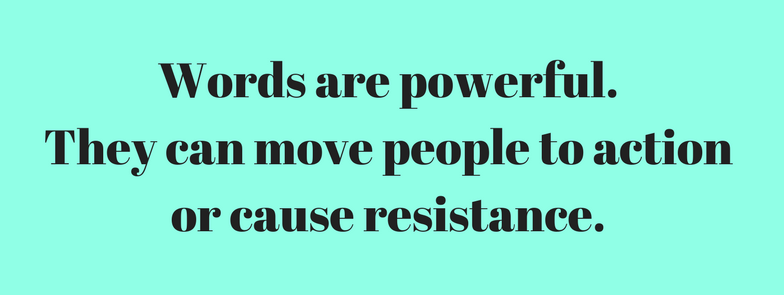
Words are powerful. They can make us feel worthy or worthless, beautiful or ugly, they can empower or destroy. Words can move people to action or cause resistance.
Yesterday morning when I woke up I said to myself, “Ugh, I am so tired. I just want to sleep. All I have waiting for me is work.” It was difficult to get myself out of bed.
This morning I woke up at the same early hour but my first words were,” Man, I need to get hopping. I have a ton of projects I want to do today.” Before I knew it I was up and in the bathroom brushing my teeth. Can I say that the projects I had waiting for me were the very same ones that hadn’t gotten finished from the day before, the same work.
What we say and how we say it impacts ourselves and others.
Last week I talked about getting kids to buy in to what we want them to do by making the mundane and everyday special. Another way to get kids to buy in is to use words well.
Neuro-linguistic programming (NLP) practitioner Alicia Eaton says that by understanding the power of language parents can get their children do almost anything without yelling, bribing, or threatening. In her book How To Get Kids To Do Almost Anything, she reminds readers that the words we use matter and so does the structure of what we say. “We use negative talk and then we’re surprised when our children don’t do what we want them to,” Eaton says.
Here are a few tips for using words and phrases that will get your kids to buy in more often.
1. Say what you want and not what you don’t want
A friend of mine, Bob Nicoll, wrote about the power of words in getting people to take certain actions in his book Remember The Ice. His passion was reminding people to say what you want and not what you don’t want.
• Don’t leave a mess. vs Clean up when you’re done, please.
• You have to stop being late for school vs Let’s get our bikes and see if we can be early for school today.
2. Allow choice
• Put your shirt on, were late for church. vs Which shirt will you wear today, the blue or the red.
• What do you want to do first, put away the blocks or pick up the books?
3. Make words and phrases positive
• Let’s leave the room tidy and put all the Lego away. vs You guys clean up this mess and put those Lego’s away.
• Keep the paint on your paper, OK. Vs Don’t make a mess.
Recently a mom said to me, “When I want my children to clean up after themselves I say, “Put away your project rather than put away your mess.” Isn’t that brilliant! I mean, who wants to clean up a mess. But putting away an important project, well now, that’s a horse of a different color.
4. Speak as if they have already bought in.
• When you get your room done we will have a snack.
• When we get done picking up the living room we’ll go for a walk.
5. Try saying thanks at the beginning rather than at the end.
• Please put your shoes in the closet. Thanks for helping.
• Can you help me sweep the walk? I appreciate your help.
Using words well generates positive energy and feelings. The more positive the words the better chance for the outcome we want. Using words positively and well is a skill. Skills can be learned. We do it by practicing and remembering that simple things, done consistently over time, bring BIG results.
Have an experience using the power of words? Please share. We would all love to know!
